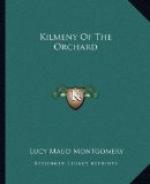The next day was Sunday and Eric went to church twice. The Williamson pew was one of the side ones at the top of the church and its occupants practically faced the congregation. Eric looked at every girl and woman in the audience, but he saw nothing of the face which, setting will power and common sense flatly at defiance, haunted his memory like a star.
Thomas Gordon was there, sitting alone in his long, empty pew near the top of the building; and Neil Gordon sang in the choir which occupied the front pew of the gallery. He had a powerful and melodious, though untrained voice, which dominated the singing and took the colour out of the weaker, more commonplace tones of the other singers. He was well-dressed in a suit of dark blue serge, with a white collar and tie. But Eric idly thought it did not become him so well as the working clothes in which he had first seen him. He was too obviously dressed up, and he looked coarser and more out of harmony with his surroundings.
For two days Eric refused to let himself think of the orchard. Monday evening he went cod-fishing, and Tuesday evening he went up to play checkers with Alexander Tracy. Alexander won all the games so easily that he never had any respect for Eric Marshall again.
“Played like a feller whose thoughts were wool gathering,” he complained to his wife. “He’ll never make a checker player— never in this world.”
CHAPTER VI. THE STORY OF KILMENY
Wednesday evening Eric went to the orchard again; and again he was disappointed. He went home, determined to solve the mystery by open inquiry. Fortune favoured him, for he found Mrs. Williamson alone, sitting by the west window of her kitchen and knitting at a long gray sock. She hummed softly to herself as she knitted, and Timothy slept blackly at her feet. She looked at Eric with quiet affection in her large, candid eyes. She had liked Mr. West. But Eric had found his way into the inner chamber of her heart, by reason that his eyes were so like those of the little son she had buried in the Lindsay churchyard many years before.
“Mrs. Williamson,” said Eric, with an affectation of carelessness, “I chanced on an old deserted orchard back behind the woods over there last week, a charming bit of wilderness. Do you know whose it is?”
“I suppose it must be the old Connors orchard,” answered Mrs. Williamson after a moment’s reflection. “I had forgotten all about it. It must be all of thirty years since Mr. and Mrs. Connors moved away. Their house and barns were burned down and they sold the land to Thomas Gordon and went to live in town. They’re both dead now. Mr. Connors used to be very proud of his orchard. There weren’t many orchards in Lindsay then, though almost everybody has one now.”
“There was a young girl in it, playing on a violin,” said Eric, annoyed to find that it cost him an effort to speak of her, and that the blood mounted to his face as he did so. “She ran away in great alarm as soon as she saw me, although I do not think I did or said anything to frighten or vex her. I have no idea who she was. Do you know?”




